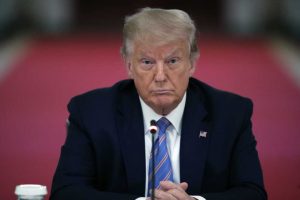Newly Released Documents Show Exactly How Trump Admin. Undermined CDC During Pandemic

Documents and interview transcripts released by a congressional committee shine additional light on how the Trump administration interfered with the Centers for Disease Control and Prevention, undermining the agency’s efforts to communicate the seriousness of the pandemic to the American people as the virus began to spread throughout the country.
Emails and transcripts of interviews with former senior CDC officials released by the House select subcommittee on the coronavirus crisis reveal just how far administration officials went to tamp down the CDC’s public health communication efforts in the face of an emerging viral threat.
“The Trump Administration’s use of the pandemic to advance political goals manifested itself most acutely in its efforts to manipulate and undermine CDC’s scientific work,” committee Chair Rep. James Clyburn (D-S.C.) wrote to Trump’s former CDC Director Dr. Robert Redfield. “Through its investigations, the select subcommittee has uncovered a staggering pattern of political interference from Trump Administration officials in critical aspects of CDC’s pandemic response efforts.”
According to the committee’s interview of former National Center for Immunization and Respiratory Diseases Director Nancy Messonnier, she confirmed media reports that she had angered Trump when she told the media in Feb. 2020 that the virus could cause “severe” disruptions to daily life. Her remarks prompted phone calls from then-HHS Secretary Alex Azar and Redfield. Speaking about her call with Azar, Messonnier said that she was “upset” by the conversation.
“I believed that my remarks were accurate based on the information we had at the time,” Messonnier said. “I heard that the president was unhappy with the telebriefing.”
To distract from Messonnier’s remarks, the administration planned another briefing, former CDC Principal Deputy Director Anne Schuchat told the committee when she testified.
“The impression that I was given was that the reaction to the morning briefing was quite volatile and having another briefing — you know, later I think I got the impression that having another briefing might get — you know, there was nothing new to report, but get additional voices out there talking about that situation,” Schuchat said.
For three months after the February briefing, the administration banned CDC officials from conducting any public briefings at the very same time the virus was rapidly spreading throughout the United States. The administration additionally denied numerous media requests for interviews with CDC officials. Schuchat said that she and many of her fellow CDC scientists felt that they “were hamstrung by a White House whose decisions are driven by politics rather than science.”
Instead of having the CDC lead the federal response to the pandemic, the White House took matters into its own hands by holding its own briefings and refusing to allow the CDC to speak directly to the public. One Health and Human Services employee even ordered CDC employee Dr. Christine Casey to “put an immediate stop to” the publication of its weekly scientific reports, the Morbidity and Mortality Weekly Report (MMWR). In an email to Redfield, then-HHS Science Adviser Paul Alexander accused the CDC of “writing hit pieces on the administration” in the reports.
In her testimony before the committee, Casey said she was instructed by Redfield to delete that email, a request she said “seemed unusual” and “made me uncomfortable.”
The evidence also shows that the administration made changes to CDC recommendations on how to slow the spread. The White House instructed the CDC to soften language giving guidance to meatpacking plants on how to protect their workers from getting the virus after the virus disrupted production at a number of plants. And Dr. Scott Atlas, who was a special advisor to Trump, abruptly changed the CDC’s testing guidance to recommend asymptomatic people do not need a test even after they were exposed to the virus.
This recommendation was not the correct public health response, Dr. Deborah Birx testified to the committee, and she believed the administration made the recommendation in order to reduce the number of positive Covid tests. “This document resulted in less testing and less — less aggressive testing of those without symptoms that I believed were the primary reason for the early community spread,” Birx told the committee, adding, “I did not agree with the guidance as it was written.”
Source: Read Full Article
